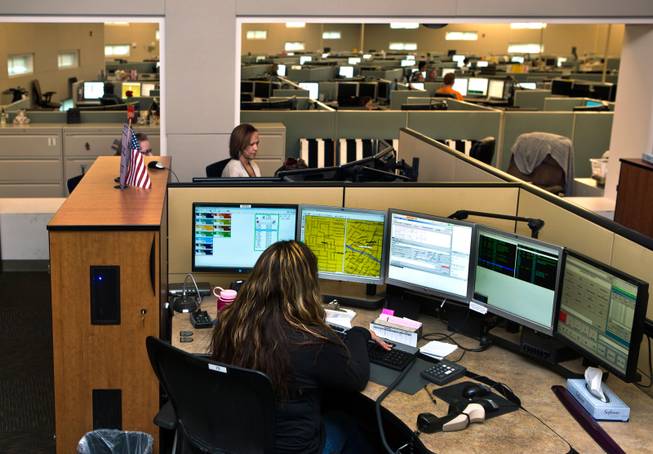
One of the many personnel in the communications room for 911 operators at the Metro Police dispatch center on Friday, April, 10, 2015.
Monday, Feb. 5, 2018 | 2 a.m.
When a gunman opened fire Oct. 1 on a crowd of concertgoers from a Las Vegas Strip hotel, anyone with a radio scanner or internet connection could listen in on Metro Police radio traffic as the mayhem unfolded.
“It’s coming from upstairs in the Mandalay Bay,” an officer shouts into his radio as gunfire rains down from the 32nd floor. “Halfway up; I see the shots coming from Mandalay Bay.”
Scanners, which can be readily purchased at electronics stores or online, can be programmed to search for police and fire department transmissions, which can then be made even more widely available by groups that stream them on websites such as broadcastify.com.
But that’s all over — at least when it comes to Metro Police communications. Metro recently encrypted its radio channels, rendering scanners available to the public obsolete.
The change will let Metro guard sensitive transmissions, such as details about victims or tactical information a suspect armed with a scanner could hear over the open airwaves, Officer Jay Rivera said.
Clark County Sheriff Joe Lombardo said the switch wasn’t in response to the Oct. 1 shooting, which left 58 people dead and 851 injured. It was something that has been in the works for two years, he said.
It’s a disappointment, nonetheless, for police buffs and groups that say they are doing a public service by disseminating information gleaned from the scanner.
“It’s a real bum deal for the public,” said Mikey Slyman, a co-founder of the Las Vegas Emergency Incidents (Las Vegas Heroes) Facebook group.
The group, which has more than 50,000 members and has become an invaluable tool for people curious about police activity, relies heavily on scanner traffic to share information, Slyman said.
Just the other day, he said, a helicopter was flying over his child’s school and police cars with flashing lights were speeding through the neighborhood. “Don’t you think you should be able to access that information?” he asked.
It turned out to be nothing serious and nothing local TV stations or newspapers reported, Slyman said. “But if somebody is running through the neighborhood with a gun, I’d like to know,” he said.
And it’s not just curious ears that benefit from the information transmitted live, said Slyman, a bail bondsman and real estate agent.
He recalled a time he was listening in about police activity in his neighborhood when he spotted a burglary suspect running past his house and was able to help direct officers.
Media outlets will continue to have access to Metro channels, police said.
But Slyman said he’s not received any information about who that covers. “What is a media outlet, and what is required to become one?” Slyman asked.
Slyman said the news his group supplies is a “drop in a bucket.”
“But we’re still a good source for information to those who want to know. Call us independent media, but I think we have the right to that information,” he said.
